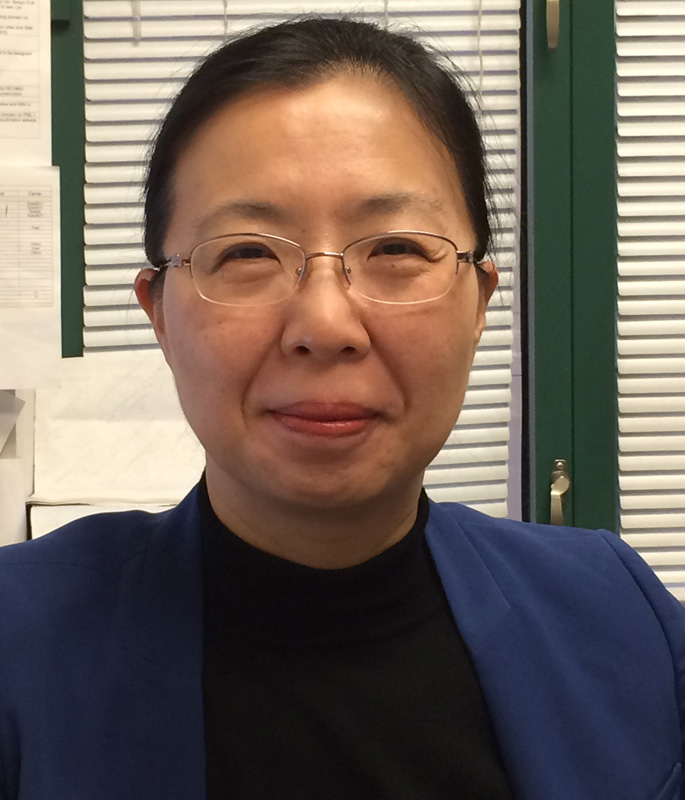
Haidong Gu
Associate Professor
313-577-6402
313-577-6891 (fax)
4117 BSB
Website(s)
Department
Department of Biological Sciences
Haidong Gu
Research interest(s)/area of expertise
With limited genetic materials, viruses are able to overcome multiple layers of host defenses and subjugate the host during infection. Understanding how viruses employ multifunctional viral proteins to target different cell machineries is the primary interest of my research. My lab focuses on herpes simplex virus 1 (HSV-1), a neurotropic virus that establishes lifelong latency in trigeminal ganglion. Sporadically it reactivates and causes a wide range of mild to severe herpetic diseases, which is a major health concern in immunocompromised patients.
Due to its unique life cycle, HSV-1 closely interacts with all levels of host immune responses. Upon infection, the incoming viral DNA encounters numerous cell intrinsic anti-viral defenses. Our current project involves an immediate early protein of HSV-1 called ICP0, a multifunctional viral protein that antagonizes multiple host anti-viral mechanisms. On one hand, ICP0 contains an E3 ubiquitin ligase activity which directly targets cellular restrictive factors, such as PML, Sp100, IFI16, for proteasome-dependent degradation. On the other hand, ICP0 interacts with various cellular proteins, including USP7, CoREST, Cyclin D3 and RNF8, to regulate a diverse array of cellular regulatory pathways. Our interest is to understand the molecular basis of how ICP0 coordinates its multiple functions to simultaneously counteract against different anti-viral defense mechanisms. We focus on a nuclear dynamic structure termed nuclear domain 10 (ND10), which contains over 150 regulatory proteins and plays a critical role in restricting viral expression at early HSV-1 infection. Specifically, ICP0 functions to degrade the ND10 organizer, PML, which consequently leads to the dispersal of ND10 and the alleviation of gene repression imposed by ND10. We found that ICP0 achieves this counteraction via a carefully orchestrated stepwise interaction with the ND10 nuclear bodies.
Education
- Ph.D., Ohio State University, Department of Molecular Cellular Biochemistry, 2001
- Post-Doc., University of Chicago, Department of Microbiology, 2011
Awards and grants
R01AI18992 (PI: Haidong Gu)
Title: Dissecting the Functional Domains of Infected Cell Protein 0 of Herpes Simplex Virus 1.
Funding Agency: NIH, National Institute of Allergy and Infectious Diseases
Funding Period: 4/15/2015 – 3/31/2020
Total Cost: $1,882,693
Selected publications
1) Jan Fada B, Reward E, Gu H*. The Role of ND10 Nuclear Bodies in Herpesvirus Infection: A Frenemy for the Virus? Viruses 13(2):239, doi: 10.3390/v13020239. (2021)
2) Gu H*, Jan Fada B. Specificity in Ubiquitination Triggered by Virus Infection. Int. J. Mol. Sci. 21(11):4088, doi: 10.3390/ijms21114088. (2020)
3) Jan Fada B, Kaadi E, Samrat SK, Zheng Y, Gu H*. Effect of SUMO-SIM Interaction on the ICP0-Mediated Degradation of PML Isoform II and Its Associated Proteins in Herpes Simplex Virus 1 Infection. J. Virol. 94(12):e00470-20.doi: 10.1128/JVI.00470-20. (2020)
4) Samrat SK, Gu H*. Temporal Analysis of the Nuclear-to-cytoplasmic Translocation of a Herpes Simplex Virus 1 Protein by Immunofluorescent Confocal Microscopy. J. Vis. Exp. 141: e58504, doi:10.3791/58504. (2018)
5) Samrat SK, Ha BL, Zheng Y, Gu H*. Characterization of Elements Regulating the Nuclear to Cytoplasmic Translocation of ICP0 in Late HSV-1 Infection. J. Virol. 92(2). pii: e01673-17. doi:10.1128/JVI.01673-17. (2018)
6) Zheng Y, Samrat SK, Gu H*. A tale of two PMLs: elements regulating the differential substrate recognition by the HSV-1 ICP0 E3 ubiquitin ligase. J. Virol. 90 (23): 10875-10885 (2016).
7) Gu H*, Zheng Y. Role of ND10 nuclear bodies in the chromatin repression of HSV-1. Virol J. 13:62. DOI 10.1186/s12985-016-0516-4. (2016).
For a complete list of publications, go to the following URL: http://www.ncbi.nlm.nih.gov/sites/myncbi/haidong.gu.1/bibliography/48244807/public/?sort=date&direction=ascending